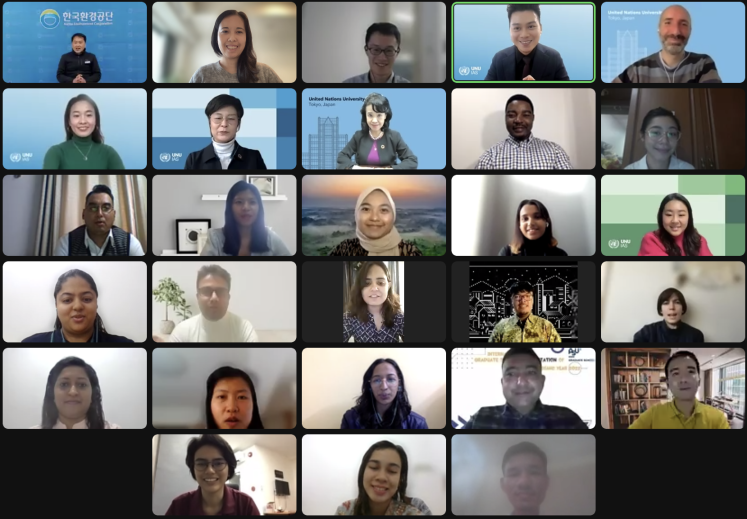The 2022 ProSPER.Net Leadership Programme was held on 5–8 and 16 December 2022, bringing together 21 participants to learn about strategies towards achieving a decarbonised economy. The online sessions engaged young professionals and emerging leaders in academia, the public sector, the business community, and civil society to build climate leadership skills needed for the net zero transition. The programme was hosted by UNU-IAS with support from the Ministry of the Environment, Japan, and Korea Environment Corporation.
In opening remarks, Shinobu Yume Yamaguchi (Director, UNU-IAS) stressed the importance of strengthening synergies to implement the Paris Agreement on climate change. She noted that UNU-IAS was committed to empowering future leaders through education and capacity building. Seung Hoon Lee (General Manager, International Cooperation Division, Department of Global Cooperation, Korea Environment Corporation) highlighted the role of youth for achieving net zero, underlining their abilities as critical thinkers, changemakers, innovators, and communicators.
Jerome Silla (Research Associate, UNU-IAS) explained that the programme focused on incorporating sustainability into leadership training and practical application skills needed to develop sustainable solutions. He outlined the programme themes: results-based project management, net-zero governance, energy efficiency and urban sustainability, and nature-based approaches to net zero.
A keynote by Sonam Wangdi (Nature Conservation Division, Department of Forests and Park Services, Royal Government of Bhutan) highlighted environmental conservation as one of the four pillars of Bhutan’s Gross National Happiness Index. Reverence for nature plays a major role in shaping the country’s conservation efforts, in addition to a constitutional mandate ensuring that 60% of land is under forest cover, a target that has already been exceeded.
Leadership activities facilitated by John Park (Visiting Research Fellow, UNU-IAS) and Shengru Li (Research Fellow and Academic Associate, UNU-IAS) presented leadership theories for sustainable development and education for sustainable development competencies.
A series of lectures explored implementation strategies, introducing the concept of stakeholder identification, outlining the benefits of stakeholder engagement as well as engagement approaches and stakeholder collaboration models. A lecture by Jonghwi Park (Programme Head, UNU-IAS) introduced principles and approaches to managing projects using results-based management (RBM).
On the second day, Hanna Kang (Post-doctoral Researcher, Climate Technology Cooperation Division, Green Technology Centre Korea) presented on net zero governance and related initiatives in Korea, including stakeholder engagement activities. Rywon Yang (Senior Researcher, Climate Technology Cooperation Division, Green Technology Centre Korea) discussed Korea’s efforts in achieving a carbon neutral society, such as the Framework Act on Carbon Neutrality and Green Growth. Jihei Song (Senior Researcher, Center for International Development Cooperation, Korea Institute for International Economic Policy) discussed policy development, implementation, and review, focusing on Korea’s Net Zero Policy.
The third day began with a lecture by Tsuyoshi Fujita (Professor, University of Tokyo), who spotlighted energy efficiency as a bridge to carbon neutrality, the challenges for cities, and quantification models for sustainable urban planning. Fumitake Takahashi (Associate Professor, Tokyo Institute of Technology) discussed energy efficiency in waste management, including a psychological approach on waste segregation. Philip Vaughter (Research Consultant, UNU-IAS) explained the principles of sustainable urban design, the impacts of zoning and “third spaces” in cities, and their roles in net zero solutions in urban settings. A lecture by Jorge Almazan (Associate Professor, Keio University) focused on Tokyo and its urban development and transformations, noting the distinction between “corporate Tokyo” and “emergent Tokyo”.
The final day of the programme featured a presentation by Philip Vaughter on nature-based solutions. Rodrigo De Sousa (Implementation Manager, Osa Conservation) discussed reforestation and sustainable land use, highlighting the Ridge to Reef project, which works to restore agricultural landscapes in Costa Rica.
The programme concluded with group presentations focusing on net-zero transition strategies that could be incorporated in a city or community.
Further information on the programme and its outcomes is available on the ProSPER.Net website.


